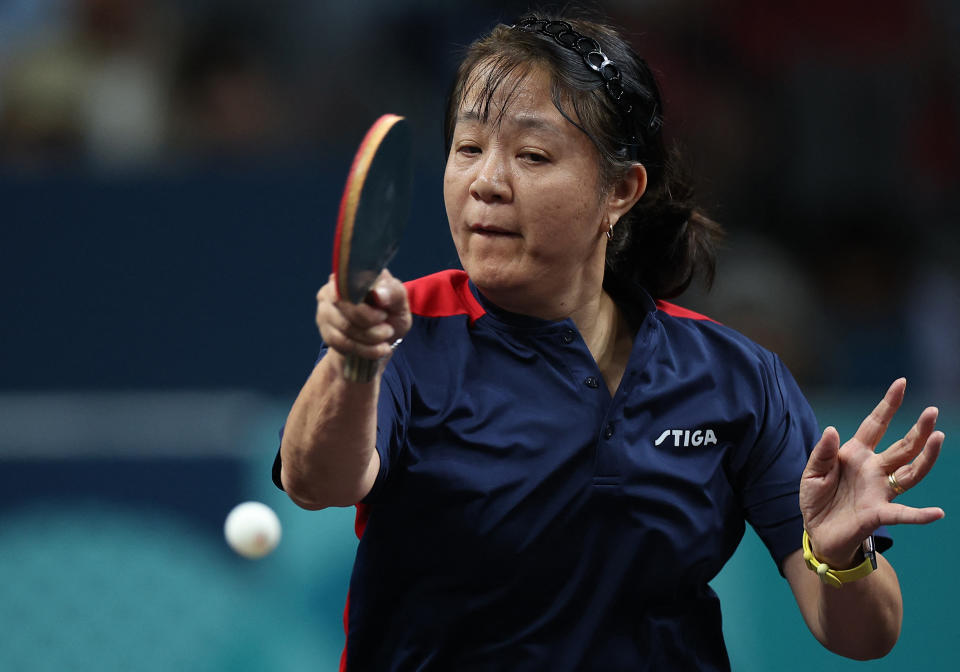Medal table | Olympic calendar | Olympic News
PARIS — At the height of the COVID-19 pandemic, Zhiyeng Zeng needed to find a way to get some exercise when going to the gym wasn’t an option.
The 54-year-old woman dusted off the ping-pong table and paddle that had been unused for decades in her home in northern Chile.
Zeng was a child table tennis prodigy in China, but trying to become the best ping-pong player in her home country is a lot like trying to become the best soccer player in Brazil. In 1986, at age 20, Zeng retired from the Chinese national team, convinced that her childhood dream of representing her country at the Olympics was dead.
When a Chinese coach offered her a job teaching children in Chile in 1989, Zeng moved to the other side of the world, to a country where few could pronounce her first name. She became “Tania” to Chileans and coached table tennis for a while before eventually quitting the job to pursue a career in business.
Zeng, now 58, laughed on Saturday afternoon when asked if she ever imagined participating in the Olympics four years ago, when she started playing table tennis again. She reiterates that it was not “a big dream” for her back then. Staying fit was the only mission.
Rediscovering her childhood love of table tennis eventually inspired Zeng to be more ambitious once pandemic restrictions eased. She entered a few local tournaments for fun and won them with ease. She then did the same at the national level. By 2023, she was Chile’s top-ranked player and was competing for the South American country’s national team.
Zeng became a sensation in Chile last year when she won first place at the South American Games and took bronze at the Pan American Games. Chileans nicknamed her “Aunt Tania.” She gained thousands of new followers on Instagram. Even Chilean President Gabriel Boric watched her come back from two sets down in a match and then congratulated her on a “tremendous” victory.
These successes rekindled Zeng’s childhood dream, which had been dormant for a long time.
“Why not the Olympics?” Zeng recalls allowing himself to think.
On Saturday afternoon, at the sprawling convention center that Paris 2024 organizers have converted into a stadium, Zeng’s dreams came true. She raised her hands in acknowledgement of the near-stadium-filling crowd as she walked onto court one to face Lebanon’s Mariana Sahakian in a rare Olympic showdown between two athletes in their 40s.
For a set and a half, this fairy-tale story seemed destined for a happy ending. Zeng effortlessly won the first set 11-4 and took an 8-4 lead in the second set. She skillfully slowed the ball and disguised the direction with a series of spins and then took advantage when she had the opportunity to end a point by being more aggressive.
But Sahakian gradually became more comfortable playing Zeng and the player who had waited decades to make her Olympic debut began to lose patience. She sought out winners at times when extending her points lead might have been the more prudent option.
As the game began to slip away from Zeng, some Chilean fans in the crowd tried to spark a comeback.
“Tanya! Tanya! Tanya!” they chanted as she trailed two games to one.
“Chi-chi-chi, Le-le-le,” they roared when she called a timeout after losing the first three points of the fourth game.
Eventually, the applause died down and resignation set in. Zeng fell in five games (11-4, 12-14, 5-11, 3-11, 8-11).
When Zeng and Sahakian went to talk to reporters after the match, it was difficult to tell who had won and who had lost. Journalists from China, South America, Europe and the United States rushed to talk to Zeng. She patiently answered all the questions and her smile almost never left her face.
“This day was a gift from God for me,” he said. “I may have lost, but I don’t feel that way.”
The crowd support and international media attention were a bit disconcerting for Zeng. On several occasions, when speaking to reporters, she protested: “I don’t feel like a star.”
Still, when asked what her message was to Chilean fans, Tía Tania did not hesitate.
“My message is that if you want to do something, you have to do it,” he said. “Don’t wait, don’t think about it, don’t worry about it.
“In my case, I never thought I would be able to play in the Olympics, but now I am here.”
Zeng’s advice serves as a reminder that the biggest winners at the Olympics don’t always have medals around their necks.
For some athletes, just getting to Paris is victory enough.


